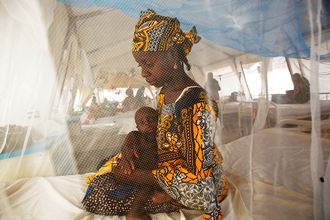The UNICEF has said that introducing Multiple Micronutrient Supplements (MMS) for pregnant women will reduce maternal and infant mortality in Nigeria.
The UNICEF Kano Field Office Nutrition Specialist, Oluniyi Oyedokun, stated this on Thursday in Kaduna during a two-day stakeholders’ inception meeting on scaling up MMS in Kano State.
The Federal Government has initiated the transition from Iron and Folic Acid Supplements to MMS for pregnant women to ensure better birth outcomes.
This decision aligns with the 2020 WHO recommendation on antenatal care for a positive pregnancy experience.
Oyedokun noted that the MMS intervention is sponsored by the Bill and Melinda Gates Foundation, with only five states in Nigeria, including Kano, currently benefiting from the project.
He described MMS as “the most essential and common solution to anaemia in pregnant women globally.”
Emphasizing Kano’s significance due to its large population, Oyedokun urged the state government to support the intervention.
He explained that the meeting aimed to share the concept and deliverables of the Bill and Melinda Gates Foundation (BMGF)-funded MMS scale-up project with state-level stakeholders in Kano State.
He added that the meeting was also intended to outline and agree on the roles and responsibilities of partners, identify the enabling environment for leveraging government resources for MMS procurement, develop a work plan, and agree on implementation modalities.
Oyedokun called on policymakers to expedite the release of funds for MMS procurement to save the lives of pregnant women and future generations.
He also urged stakeholders to consider the prevention of anaemia in pregnancy from a holistic perspective, including social and behavioral change.
Furthermore, the nutrition specialist emphasized the importance of creating an enabling environment for MMS acceptability and intervention to prevent anaemia among pregnant women.
According to him, the partnership between UNICEF, the Bill and Melinda Gates Foundation, Alive and Thrive, and CS-SUN aims to improve pregnancy outcomes.
He highlighted the critical importance of the first 1,000 days of a baby’s life, beginning with the nine months in the womb and continuing through the first two years after birth, for the well-being of both mother and child.
Ensuring good nutrition for women of childbearing age and expectant mothers is crucial for the healthy development of the baby, even at the fetal stage.
“The first 1,000 days are what determine the criticality of the child’s development. From the womb, infancy, and early childhood, the first 1,000 days are the critical window for growth and development,” he said.
Earlier, the Commissioner for Health, Dr. Abubakar Labaran, commended UNICEF and its partners for their prompt intervention in supporting the Kano State Government, particularly on issues concerning primary healthcare for children and pregnant women.
“We appreciate UNICEF and other partners for collaborating with the Kano State Government to overcome all health challenges, particularly anaemia among children under five years and pregnant women,” he said.
Represented by the acting Permanent Secretary in the ministry, Shehu Sani, the commissioner revealed that arrangements have been finalised to release a N500 million MMS intervention fund as directed by Governor Abba Yusuf.


